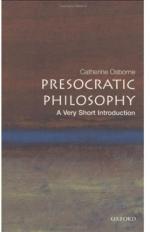|
This section contains 3,748 words (approx. 13 pages at 300 words per page) |

|
Overview
Between the sixth and the third centuries B.C., the classical Greek philosophers proposed numerous theories regarding the material composition of the universe, with those of the atomists, Aristotle (384-322 B.C.), and the Stoics emerging as the major alternatives. While providing the intellectual foundations for subsequent developments in Western chemistry and physics, the primary purpose of these theories was not to offer a scientific account of nature in the modern sense, but rather to pose and answer philosophical questions regarding the structure of reality, the certainty of knowledge, and the formulation of ethical principles.
Background
Like those of other ancient civilizations, the earliest Greek cosmological theories were mythological accounts of the creation of the universe by the gods. However, in about 600 B.C. a tradition of speculative thought emerged that...
|
This section contains 3,748 words (approx. 13 pages at 300 words per page) |

|


